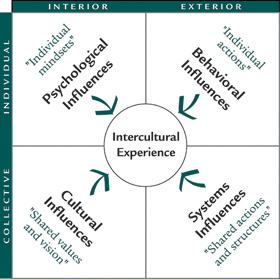 No matter what your motivations are to accept an international assignment, the moment you agree to relocate with your organization, you are signing a contract with yourself and your growing edges. You commence a path that will challenge deep assumptions, trigger psychological shadows, expand perspectives, and shake the ground for change to happen to you and those around you.
No matter what your motivations are to accept an international assignment, the moment you agree to relocate with your organization, you are signing a contract with yourself and your growing edges. You commence a path that will challenge deep assumptions, trigger psychological shadows, expand perspectives, and shake the ground for change to happen to you and those around you.
What really influences your relocation? There are visible and invisible factors. What are visible to the eyes are all the external factors that lead to the excitement and the stress of the relocation. What are unseen are individual and collective deep structures that play a fundamental role in the creation of your future. Wouldn’t you want to be aware of these structures given how much they will influence your international relocation?
Most assignees I work with arrive in the training room unaware of the connection between what is going on inside themselves and the life they want to shape. Their focus and energy remain, most of the time, concentrated on challenges with intercultural communication, culture shock symptoms, the logistics of relocation, dos and don’ts, and many aspects of cultural differences. These areas are all important. Yet rarely does someone discuss the impact of his or her own perspective and inner world on the transition. Why?
Traditional intercultural programs mainly address cultural, behavioral and systems influences on international assignments. A fourth perspective is needed in order to include the interior realm of human beings. Here is a quick glance into the dimensions influencing your intercultural experience:

The quadrants: Adapted from Ken Wilber
Cultural: culture (e.g., team, organizational, or societal culture), shared worldviews (e.g., philosophical or religious), shared mindsets, shared values, ethics, joint meaning, communication (or lack of it), relationships, language differences, symbolism, etc.
Behavioral: your own or another person’s behavior, performance, actions, technical knowledge, competencies, skills, physical health, degree of physical energy, etc.
Systemic: systems, structures and processes (e.g., environmental, social, economic, financial, political, legal, technological, technical, educational, informational), as well as from shared actions. This includes the areas of strategies, goals, metrics, and policies.
Psychological: your own or another person’s mindset, attitude, awareness, emotions, denial, beliefs, commitments, intentions, personal values, degree of cognitive intelligence, personality style, degree of emotional intelligence, etc.
These four aspects of your relocation must be taken into account in order for you to successfully navigate the territory of an international assignment.
